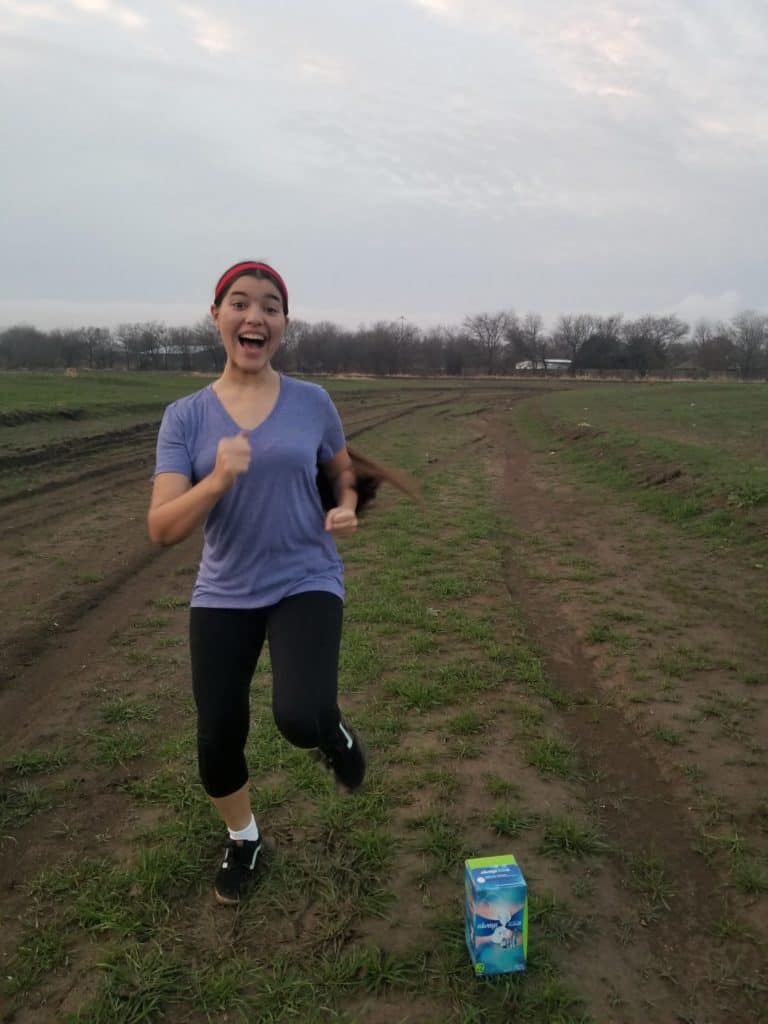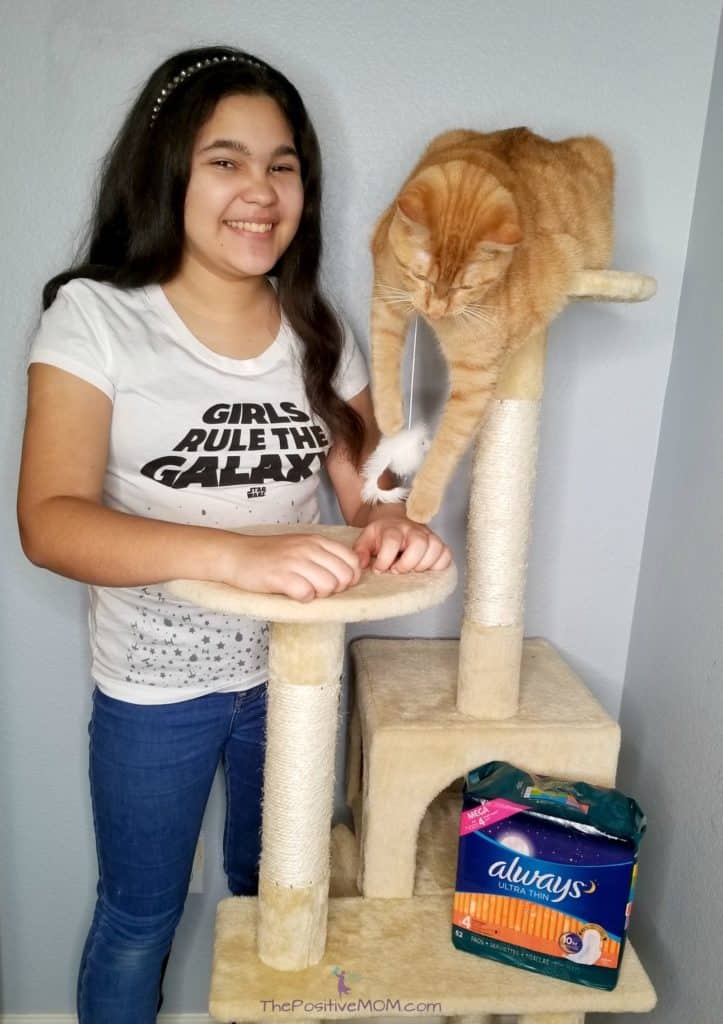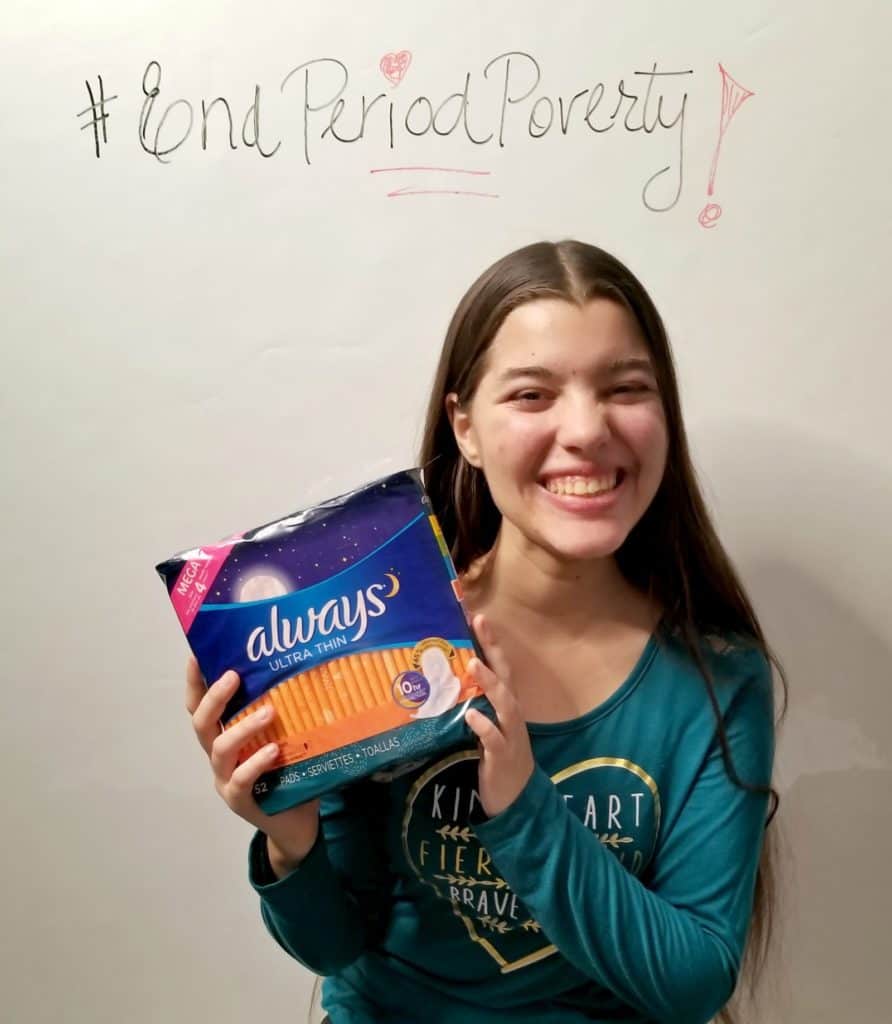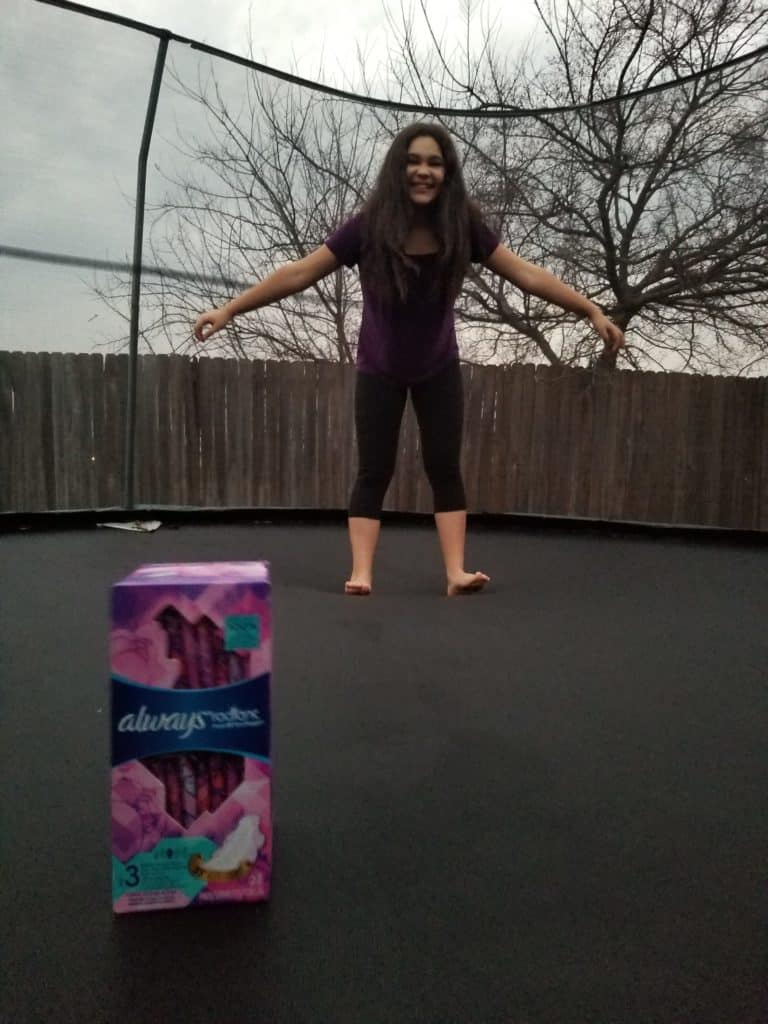
If you look up the word “poverty” in the dictionary, you’ll see that “the state of being inferior in quality or insufficient in amount” is among the main definitions. “Period Poverty” refers to lack of access to period protection during menstruation.
When I share my experience with Period Poverty, many aren’t surprised. After all, we didn’t have access to much and, naturally, when you live in a slum and can barely afford food, it makes sense that period products are considered a luxury, rather than a necessity or a basic human right.
But here’s the deal: Period Poverty is not an issue exclusive to developing countries. Nearly 1 in 5 girls in the USA have missed school because they can’t afford period protection. But it’s not just school they miss. It also means missing out on activities they love. The side effects of missing out on their activities outside of school can be just as real because these activities help build her confidence and skills, and missing out can limit a girl’s potential and opportunities far beyond puberty.

Period poverty is quite prevalent and this statistic is both shocking and alarming because it’s not just an inconvenience to have to “improvise” their sanitary wear, it is an experience that proves to be beyond uncomfortable and humiliating: it decreases their confidence, their sense of dignity, and overall quality of life. Period Poverty may even impact mental health.
Both Poverty and Periods are highly stigmatized experiences that people avoid talking about, so it’s no wonder that Period Poverty has a long-lasting negative effect on a teenage girl or non-cisgender menstruator.
In the same sense, puberty empowerment can impact someone positively, so by supporting them during their menstrual cycle, we can transform Period Poverty into Period Positive!
I am excited to support Always in their powerful Always Live #LikeAGirl movement, aimed at keeping teens involved in the confidence-boosting activities they love – by helping tackle period poverty. As a teenager, my self-esteem was extremely low and I dreamed of being able to wear Always pads, so this is really a full circle moment for me!

Let’s make period poverty history and help puberty become a time of positive growth in all areas of life.
Here are 3 simple ways we can all help END PERIOD POVERTY:
1- Talk about menstruation without stigma and shame. By continuing to keep menstruation a taboo, it is harder to educate teenagers about period protection and it is easier to ask for help when one is comfortable with having a frank conversation. Another reason why the topic of menstruation is so important to speak freely about is the fact that it reflects the gendered inequalities that plague our society today.
As moms, we have the opportunity to change the narrative, starting with our daughters. I know that you’ve heard and maybe even felt that talking about periods can be awkward or scary, but it doesn’t have to be. You may also think that your tween or teen is going to react in disgust (think “ew, gross!”), but that doesn’t have to be the case either.
I believe the key is talking to our daughters early and often. Eliana is only 5 and she’s already excited about her menstruation because we’ve discussed that, when her body is ready, her body will change and it will be like her sisters’ and then like her Mami. “The period talk” is more of an open and honest ongoing family conversation, than a one-time sit-down one-on-one chat.
Like every child, my little one is curious and asks questions, so I like to answer in age-appropriate terms, getting more specific and detailed as she grows up, just like I did with her older sisters. As we normalize puberty and periods, we help our daughters understand and feel comfortable and confident with their bodies. We encourage body positivity, clear up misconceptions, and bond with her through this experience you have in common.
And since boys also start seeing pubic and underarm hair and other changes in their body during puberty, it would be great to teach them about menstruation so they are sensitive and supportive.
I know that many of us moms didn’t ever have the period talk with our own mothers, so it may be great to learn or refresh our memories to prepare for the flood of questions: What is menstruation? When will I get it? How long does it last? How do I track it? Does it hurt? How do I use a pad? What kind of pad is best for me? Should I tell anyone? What is Period Poverty?
It may be tempting to just hand your daughter a book or video, and although that may be something you can do together, chatting is still essential, because you get to listen to her! At 16 and 15, Elisha and Elyssa have some wise, interesting, and insightful words to say. I love our discussions!
2- Take action. To help end Period Poverty, Always and Walmart are donating a year’s supply of period products to 50 teams in 50 states. In addition, for every purchase of a 3-pack box of Always Pads, Always will donate a pack to girls in need across the US.

It’s easy to help – I know because I tried it with my daughters! All you have to do is purchase a 3-pack box of Always Pads ONLINE at Walmart.com during the month of January and Always will donate a pack to girls in need. It’s a win-win – you stock up AND help a girl stay in the activity she loves.
You can order the Always pad types and sizes that best suit your needs (and your daughters, nieces, goddaughters) or anyone you think might need period products.
I’m stocking up to give back by making these donation-triggering purchases because I am very passionate about putting an end to Period Poverty. I prefer to live in a world where no girl has to limit their potential by missing school or give up on the enriching activities she loves because she’s on her period.
3- Support the movement. Use the hashtag #EndPeriodPoverty to spark conversation and inspire others to help those who are experiencing the trauma of Period Poverty. Many families don’t know they take access to menstrual products for granted and others don’t know they are not alone in their Period Poverty hardship. The first step to end a problem is awareness, so my daughters and I are excited to support Always in this initiative.

I want teens to stop worrying about the lack of access to basic sanitation and period products, and focus on education, on self-improvement and on enjoying this beautiful time in their lives, instead.
With lower abdomen cramps, back pain, bloating, breast tenderness, dizziness, headaches, and other debilitating conditions, “that time of the month” is hard enough already. Both my daughters experience these symptoms and more, and it is so helpful to know their mom has them covered.
Worries about accessing safe hygiene supplies should not be added to the list.
Let’s help end period poverty, together! Will you help me end the trauma of Period Poverty? Speak up, use the hashtag, and stock up to give back to make a difference!
Also, make sure you follow @Always on Twitter, @Always on Facebook, and @Always_brand on Instagram, and make sure to join the conversation on social using Always Live #LikeAGirl and #EndPeriodPoverty.
Founder of the Positive MOM® and creator of the S.T.O.R.Y. System: a blueprint to craft and share powerful stories that will transform your results and help others do the same. Dr. Elayna Fernández is a single mom of 4, an award-winning Storyteller, Story Strategist, and Student of Pain. She’s a bestselling author, internationally acclaimed keynote speaker, and 5x TEDx speaker. She has spoken at the United Nations, received the President’s Volunteer Lifetime Achievement Award, and was selected as one of the Top Impactful Leaders and a Woman of Influence by SUCCESS Magazine. Connect with Elayna at thepositivemom.com/ef and follow @thepositivemom. To receive a gift from Elayna, click HERE.

Want to support the Positive MOM blog?
The mission of the Positive MOM blog is to help moms break trauma cycles, find peace, and feel emotionally whole, so they can practice supportive parenting and create a positive and healthy environment for their children. If you found Elayna’s content valuable, please consider donating a love offering to enable her to keep creating content and helping more moms worldwide. Donate HERE.

Khushboo Motihar
Friday 18th of January 2019
Period poverty is a global issue. There are so many countries including mine that do not understand the impact periods can have on a child's education and in turn future. You are spreading awareness on an important issues
Nayna Kanabar
Thursday 17th of January 2019
This is an excellent post raising awareness of period poverty.In some cultures its still a stigma to talk about these topics and young girls suffer in silence. Hats off to Walmart for supporting such a great campaign.
Fatima Torres
Thursday 17th of January 2019
We've been educating our boys on periods and what it means to the reproduction cycle. Also, with a baby girl who is turning 1 this year, it's important to open the discussion with her brothers, not just with girls. Thanks for sharing the info on how menstruation can impact those who are in need.
Shweta koul
Thursday 17th of January 2019
I love reading your blogs, they are very informative for the girls out there. We should talk more often about mensuration, seriously it helps to bring lot of change in the society.
Lydia Smith
Thursday 17th of January 2019
This reminds of my first-period talk as a teenager. My mom didn't have it with me, I learnt it from one of my teachers. Hoping there are more moms comfortable with having this discussion with their kids. Thanks to NGOs, Always, and people like doing great things about these things.
Elayna Fernandez ~ The Positive MOM
Friday 18th of January 2019
What a wonderful teacher to have!